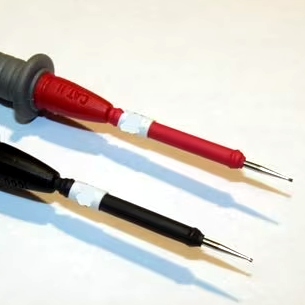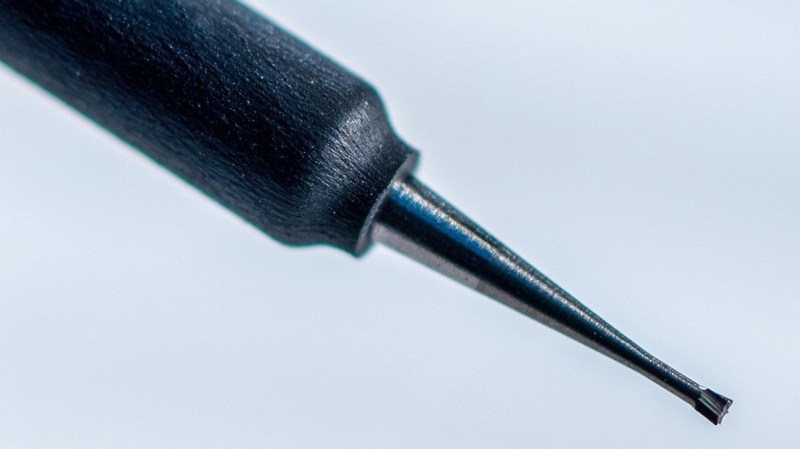Cross-pollination between different industries can yield interesting innovations, and a few years ago [John Wiltrout] developed some non-slip meter probe adapters. He recently used our tips line to share some details that you won’t see elsewhere, letting us know how the idea came to be.
It started with [John] being frustrated by issues that will sound familiar: probes did not always want to stay in place, and had a tendency to skid around at the slightest provocation. This behavior gets only more frustrating as boards and components get smaller. John was also frustrated by the general inability to reliably probe through barriers like solder masking, oxidation, and conformal treatments on circuit boards.

At the time [John] was in the dental equipment service industry, and one day he received a visit from the Good Ideas Fairy. He got the idea to use one of the special tungsten carbide tipped dental burrs as a probe tip.
The tips of these tools are in the shape of a tiny inverted cone with flutes forming a very sharp (and very hard) crown of points around the base. Using this as a probe tip worked so well that [John] knew he was onto something. Not only does such a tip stay in place wherever it is placed, but the durable micro points easily penetrate thin coatings (including the enamel on transformer wire.) [John] found that he could place his multimeter’s probes on two legs of a component, hold the probes in place with one hand, and adjust a potentiometer with the other. Bliss! As a safety bonus, the shape of the tool means it does not easily penetrate skin, despite its sharpness.
[John] turned the idea into a niche product, and while he still personally makes each set on his basement drill press, you can find them at Tag-Connect (which you may recognize as the same Tag-Connect that shrank the ICP header with their innovative connector design.)
We love it when people include details about their process, and can talk about what did (or didn’t) work. Got something to share that’s along those lines? Let us know about it!
















Nice
I use to attach sewing needles to my probes.
At a place I worked long ago, we used hypodermic needles, the bases of which accepted a banana plug perfectly.
related: pcbite uses a pogo pin with a nice tip that seems to bite very well into solder and leads.
We used to get ‘tulip’ pins for bed-of-nails testers
I already solder bed of nails tips to my multimeter probes.
It’s the only way to get onto SMT stuff reliably.
Also I have those tips that have the castellated end (for want of a better word) which are a bit like this idea.
Genius! Every set of probes should come with these
I like seeing repurposed designs like this. Makes me feel better for dumpster diving for single use medical utensils to reuse
Umm…
Be careful!
I’m afraid I can’t get the needles pit out of my head, from the Saw movies.
I remember seeing a bed of nails pogo pin where the tip was cut like a crown with three of four sharp points. Or maybe it was a scope probe.
Like this? https://www.digole.com/products_pictures/YWRtaW4=/509/p50_Q1.jpg?s=300
Exactly that. And TIL Pomona has replacement tips 6212, 6211
Tungsten carbide will form a poor PN junction with some metals (copper, brass, some steel alloys). Depending on what’s measured it may skew the results.
That would be an interesting experiment if anyone has the instrumentation to check it out. I routinely check DC voltages in the 0.1 millivolt range and resistances in the 10 mOhm range and I have not noticed any anomalies. The work I am doing is not laboratory level and just like the potential problems that might arise anytime two different metal come into contact these effects have to be considered if your work is extremely precise. I do know that the improved contact the non-slip point makes with whatever I am probing is a big improvement over using the nickel brass of the original probe tip.
Google “Spring Test Probe PAL75-F1” or “PAL75-Q1”, not from tungsten, but you can find gold plated.
And then install them in Pomona 6342 for an off-the-shelf solution :)
Having access to piano wire and a grinder I could never go back to “regular” test points. Anything but those slippery blunt short-happy things. Plus you can scratch labeling on any trace or space.
What a Great innovation! I am a field tech and work mostly on installed , In service equipment , not exactly under lab or In shop conditions. These probs save a lot of those “ I gota do that one over” moments.
A fish hook sharpener goes a long way to solving this problem.